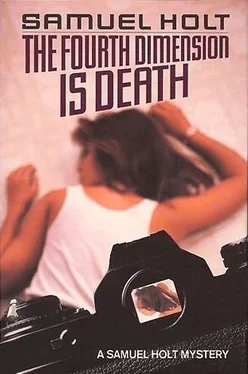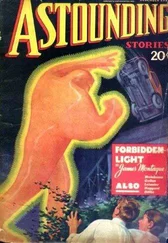Mort looked down and again read aloud: “Laura Wormley, mother of slain actor Dale Wormley, charged today that New York City police have, quote, knuckled under, end quote, to television celebrity Sam Holt. Holt, in front of whose Greenwich Village townhouse Wormley was found brutally beaten to death late Monday night, is best known for the TV series PACKARD, in which he himself played a detective. Apparently feeling that TV detectives know best, Holt, according to police officials familiar with the case, has been uncooperative in the slayings of both Wormley and the related stabbing death of young actress Kim Peyser. Holt has been particularly unforthcoming, according to these sources, in connection with the details of his relationship with both Peyser and her roommate, Julie Kaplan, Wormley’s former girlfriend.”
I lifted my head at that, but neither Feeney nor LaMarca was meeting my eye, and Mort wasn’t finished:
“According to Laura Wormley, police have told her their hands are tied in the investigation into her son’s death because of Holt’s unwillingness to talk. Quote, where I come from, end quote, paren, Mill Corner, Iowa, end paren, Mrs. Wormley said, quote, the law treats everybody alike. If my son hadn’t been killed, he’d have been a big star himself some day, but he never would have thumbed his nose at the law the way Sam Holt does. And it looks like Holt can get away with it. End quote.” Mort looked up, his expression mild. “It goes on,” he said, “but I think the point is clear.”
Feeney and LaMarca were both looking uncertain now. Feeney said, “I’m sure if Mr. Holt makes a public announcement, and we back him up on it—”
“No, I don’t think so,” Mort said. Tapping the newspaper, he said, “Babcock didn’t get this slant originally from Mrs. Wormley, and we know he didn’t get it from my client. I’m sure you didn’t intend the story to be read this way, but Babcock let his enthusiasm carry him away, and the implication is crystal clear that my client has either bribed or intimidated you into keeping at arm’s length.”
Angrily, LaMarca said, “There isn’t a word about bribes in there!”
“Nor is there anything about intimidation,” Mort told her. “‘Knuckled under’ is the phrase used. And Mrs. Wormley is quoted as contrasting police behavior in New York with that at home in Iowa, where ‘the law treats everybody alike.’ Whereas here, a famous person like Sam Holt can ‘get away with it,’ presumably because you are either in awe of him or have been paid off by him.” Rising, picking up the paper, Mort said, “Sam, I want you to go on cooperating with these two officers, answer anything they might ask that’s even remotely connected to the matter at hand. I’ll be in the other office, making phone calls.”
LaMarca said, “What phone calls?”
“There are officials,” Mort told her, “who I will want to reassure on this matter.” He looked at her more directly than he usually does. Shaking the open paper out in the air beside himself, he said, “Are you sure this is what you wanted when you started all this?” Without waiting for an answer, he left the room.
I said, “Crap like that in the paper can’t make either of us happy.”
LaMarca, still icy, said, “Not everyone will interpret the story the same way your lawyer does.”
“Not everyone,” I agreed. “I’ve told you about Julie Kaplan. I’ve told you where I was while Kim Peyser was being killed. I’ve told you my relationship, such as it was, with Dale Wormley. Is there anything else?”
“Of course there is,” LaMarca said, but beside her Feeney was getting to his feet. She looked up at him, surprised and irritated, and he said, “No, there isn’t. Thank you for your cooperation , Mr. Holt. If we need to talk to you again, we know where to find you.”
“In this office,” I said. “You’ve already searched my house, if you remember.”
“Yes, that’s right,” Feeney said. Having discovered that his high horse was dead, he was doing his best to climb down from it. He didn’t find that an easy job. “You were certainly cooperative in that,” he assured me. “I’m sure we can work things out with Dick Babcock.” Laughing uneasily — now he was the one trying and failing to make human contact — he said, “Nobody reads the Post anyway.”
“Some will today,” I suggested, “who don’t usually.”
By the time Mort came back, smiling grimly and looking triumphant, the law had fled.
From time to time, Zack Novak, my agent, sends me scripts to read, to see if I think I’m right for such-and-such a character; not that the producers have asked for me, but that Zack would volunteer me if I approved. I was in my office reading one of these, a pallid private eye story called Murder For Four Hands , in which Zack thought I might be right for Keller, the villain (bless his heart), but which was falling apart on the issue of credible motivation (there was no reason for the hero to go haring off in search of the killer, when the New York Police Department already has a staff of twenty-one thousand people), when Robinson buzzed to say the police were on the line.
This was about ten-thirty on the morning after my meeting with Feeney and LaMarca in Mort’s office, and I’d been wondering how long they’d take to regroup. There’d been no further nastiness in the newspapers — of course, today’s Post wasn’t out yet — and no developments in the murder investigation that I knew of. So it was with a combination of reluctance and curiosity that I said, “Okay, Robinson, I’ll take it,” and switched over to the outside line, to discover it wasn’t my favorite detectives calling after all.
“Mr. Holt?” said a woman’s voice that was not LaMarca. “This is Sergeant Shanley, we met back in February.”
“Oh, yes, of course.” My house had been broken into back then — I was away from it at the time, fortunately — and a man connected with an Arab terrorist group had been killed here. Sergeant Shanley, a blunt but smart woman, had been in charge of that case. But that was long finished. “What can I do for you today?”
“I’ve taken over the Wormley and Peyser homicides,” she told me. “I wonder if I could come over now and talk with you for five or ten minutes.”
Astonished, all I could think of to say was, “Sure. Come right ahead.” And it wasn’t till I’d hung up that I began to work out what this must mean.
Feeney and LaMarca had zapped themselves, that’s what it meant. In trying to smear a little bad press onto me, they’d overshot and smeared the department instead. As a result, they were off the case.
And not only that, but clearly somebody in power had decided it would be a good idea to give me a signal that the war between Holt and the police was over, so they’d gone out of their way to find an officer I’d had satisfactory dealings with in the past, and turned the case over to her. So it was, I admit, with some satisfaction that I sat there waiting for Sergeant Shanley to arrive and thinking about the departed Feeney and LaMarca.
Not that she said a word about them, when she showed up twenty minutes later. A short, wide-hipped woman of about thirty, her pale blonde hair cut short and framing a round face with clear intelligent eyes and a snub nose, Sergeant Shanley arrived alone, her manner businesslike without rudeness, and she acted as though no one named Feeney or LaMarca had ever lived. She took me briskly and unemotionally through my meetings with Dale Wormley, my movements the night he was murdered and the day Kim Peyser was killed, and that was it. “I don’t think we’ll need to bother you again,” she said, at the finish.
Читать дальше












